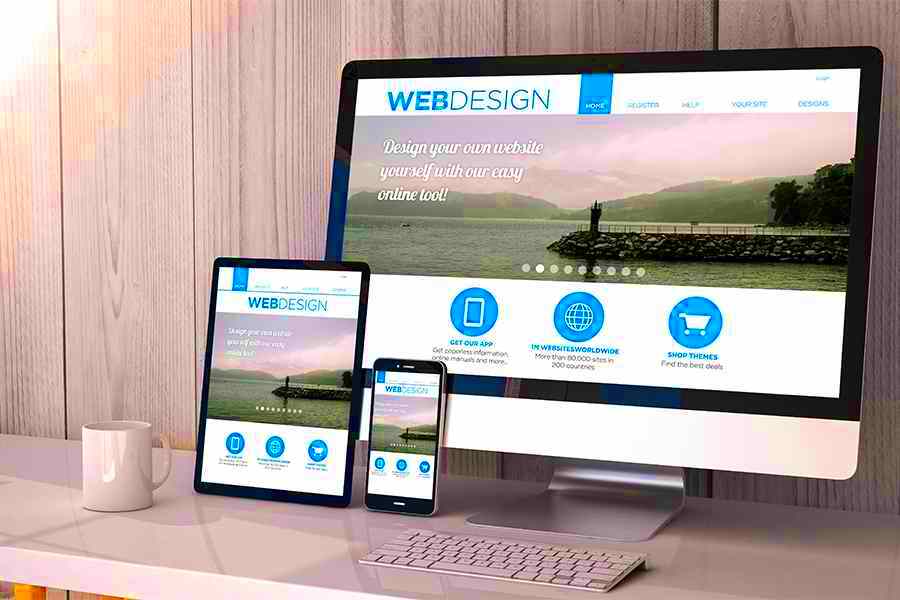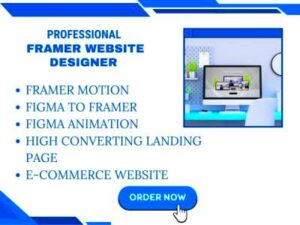Creating a website for your small business has never been easier, thanks to the plethora of website builders available today. Whether you’re looking to launch an online store, showcase your portfolio, or promote your services, the right website builder can make all the difference. In this post, we’ll guide you through the essential features to consider when choosing a website builder that aligns with your business needs. By the end, you’ll be equipped with the knowledge to make an informed decision that can help elevate your online presence.
What to Look for in a Website Builder
When selecting the best website builder for your small business, there are several key factors to consider that can significantly impact your online success. Here’s a breakdown of what you should look for:
- User-Friendly Interface: Ensure the builder has a drag-and-drop feature, making it easy for anyone—regardless of tech savvy—to use.
- Customization Options: Look for customizable templates that reflect your brand aesthetic. The more flexibility you have, the better.
- Mobile Responsiveness: With a growing number of users accessing websites via mobile devices, ensure your website will look great on smartphones and tablets.
- SEO Features: A good builder should offer tools to optimize your site for search engines, including customizable URLs, meta tags, and sitemaps.
- Integration with Other Tools: Consider how easily the builder can integrate with other platforms you might use, such as email marketing tools or social media.
- Affordable Pricing: Look for a pricing plan that aligns with your budget. Many builders offer free trials, so you can test before committing.
- Customer Support: Check for the availability of customer support via chat, email, or phone. This can be critical if you run into any issues.
By keeping these factors in mind, you can confidently choose a website builder that fits your needs and helps your small business thrive in the digital world.
Top Website Builders for Small Businesses
When it comes to choosing the right website builder for your small business, you want something that is user-friendly, versatile, and fits your needs without breaking the bank. Here’s a roundup of some of the top website builders that cater specifically to small businesses:
- Wix: Known for its stunning templates and drag-and-drop interface, Wix is a favorite among small business owners. You can start for free and upgrade later as your needs grow.
- Squarespace: If you’re looking for beautiful design and great ecommerce capabilities, Squarespace is worth considering. It’s perfect for creative businesses like photographers or boutique shops.
- Weebly: Another user-friendly option, Weebly allows for easy customization with its drag-and-drop feature. It’s particularly good for businesses focused on local services, like restaurants and shops.
- Shopify: If your small business revolves around ecommerce, Shopify is industry-leading. It offers fantastic tools for managing products, payments, and logistics effortlessly.
- WordPress.com: For those who want extensive customization and control, WordPress.com is a powerful option. It has numerous themes and plugins to enhance functionality, catering to diverse business needs.
Each of these builders has its unique strengths and caters to various types of businesses. So, it’s essential to choose one that aligns with your goals!
Comparing Features and Pricing
Pricing and features can make a huge difference in selecting the right website builder. Here’s a concise comparison of the five options we just discussed, focusing on their key features and typical pricing models:
| Website Builder | Key Features | Starter Pricing |
|---|---|---|
| Wix | Drag-and-drop editor, App Market, Free plan available | Starts at $14/month |
| Squarespace | Elegant templates, built-in ecommerce, SEO tools | Starts at $16/month |
| Weebly | Simple editing, integrated marketing tools, mobile responsive | Starts at $6/month |
| Shopify | Ecommerce focused, payment gateway integration, reporting tools | Starts at $39/month |
| WordPress.com | Highly customizable, plugins and themes, blogging feature | Starts at $4/month |
Note that many of these platforms also offer trial periods or money-back guarantees, so you can test them out before fully committing. Ultimately, the best choice depends on what features you value most and how much you are willing to invest.
5. Ease of Use: Which Builder is Right for You?
When it comes to selecting the best website builder for your small business, ease of use is undoubtedly a top priority. You want a platform that doesn’t have you scratching your head at every turn but allows you to focus on what you do best: running your business. So, let’s explore some key features that can help you determine which website builder is right for you.
- Drag-and-Drop Interface: Many builders like Wix or Squarespace feature an intuitive drag-and-drop interface that simplifies the design process. You can easily add elements, rearrange sections, and customize layouts without deep technical knowledge.
- Templates and Themes: A selection of pre-designed templates is essential. Builders such as Shopify and Weebly offer a variety of customizable templates tailored specifically for small businesses. This means less time spent on design and more on functionality.
- User Guide and Support: It’s beneficial to choose a platform with excellent support. Look for one that offers tutorials, FAQs, and live chat options. Platforms like WordPress have extensive documentation and a vast community to help you out.
- Mobile Responsiveness: Ensure your chosen website builder produces websites that look great on mobile devices. Most modern builders automatically optimize for mobile, making it easier for you to reach customers on the go.
So, as you compare options, think about what features matter most to you. Remember, the right builder will resonate with your workflow and allow for growth without the learning curve becoming overwhelming.
6. Customizability and Design Options
While ease of use is crucial, the ability to customize and design your website is equally important. After all, your website is a representation of your brand, and it should reflect your unique identity and ethos. Let’s dive into how different website builders stack up in terms of customizability and design options.
- Template Variety: A rich selection of templates allows for greater personalization. Platforms like Shopify and Squarespace boast hundreds of templates with unique designs that you can easily modify to suit your aesthetic.
- Flexibility in Layout: Some builders offer more flexibility when it comes to layout adjustments. For instance, WordPress is known for its extensive plugins that let you create customized layouts, while builders like Wix have sections that can be freely adjusted.
- CSS and HTML Editing: If you have some technical skills or want complete control over your website’s design, consider platforms like WordPress. They allow users to edit CSS and HTML directly, offering a level of customizability that drag-and-drop builders might not provide.
- Advanced Design Tools: Some builders come equipped with advanced design tools like animation effects, image editors, and more. Websites such as Elementor (for WordPress) take customization to the next level, allowing you to design with precision.
Ultimately, the best website builder for your small business is one that offers the perfect balance between usability and the customization you need to craft a site that genuinely represents your brand. Take your time exploring various options; your ideal platform is out there!
SEO and Marketing Tools
When it comes to building a successful online presence for your small business, having robust SEO and marketing tools at your disposal is crucial. The right website builder should offer integrated functionalities that not only enhance your visibility on search engines but also streamline your marketing efforts.
Firstly, consider whether your chosen website builder provides the following SEO features:
- Customizable Meta Tags: The ability to edit title tags and meta descriptions allows you to optimize your pages for search engines, which can significantly improve your search rankings.
- SSL Certificates: A secure site (HTTPS) is essential for SEO and builds trust with your visitors, making it a must-have feature.
- Mobile Optimization: Google prioritizes mobile-friendly sites, so ensure that your builder offers responsive designs.
- Image Optimization: Automatic compression and alt text options help speed up your site and provide context for search engines.
- Analytics Integration: Connect with Google Analytics or other tools to track your site’s performance, visitor behavior, and conversion rates.
Marketing tools are equally important. Look for features such as:
- Email Marketing Integration: This allows you to easily reach out to your customers and keep them updated on new products or promotions.
- Social Media Integration: Connect with your social media accounts to share content and generate traffic to your site.
- Built-in Blogging Platform: A blog not only helps with SEO but also positions you as an authority in your field.
- Promotional Tools: Features like coupons, discounts, and pop-ups can attract new customers and boost sales.
With the right SEO and marketing tools, your small business can thrive online. Choose a website builder that empowers you to conquer the digital landscape!
Mobile Responsiveness
In today’s digital world, mobile responsiveness isn’t just a nice-to-have; it’s a must-have. With more people accessing websites through their smartphones or tablets, your small business website needs to provide a seamless experience on all devices. But what exactly does mobile responsiveness entail?
Mobile responsiveness means that your website will adapt to different screen sizes and orientations. Here’s why it’s important:
- User Experience: A mobile-optimized site makes it easier for visitors to navigate and find what they need, leading to higher satisfaction and lower bounce rates.
- Search Engine Rankings: Google favors mobile-friendly sites in its search results. If your website isn’t responsive, you could miss out on valuable traffic.
- Loading Speed: Mobile-friendly websites are generally faster, which is crucial because slow-loading sites frustrate users and drive them away.
- Accessibility: A responsive design ensures that all buttons, links, and forms are easy to interact with on mobile devices, making it more accessible to everyone.
When evaluating a website builder, consider using the following criteria to determine its mobile responsiveness:
| Feature | Importance |
|---|---|
| Responsive Templates | Automatically adjust layout based on the device |
| Mobile Preview | Preview how your site looks on mobile before publishing |
| Touch-Friendly Design | Buttons and links should be easy to tap on touch screens |
In summary, mobile responsiveness should be a top priority when selecting a website builder for your small business. Make sure your website looks and works great whether your customers are at home on their laptop or on the go with their phone. This is key to maximizing your reach and impact!
Integration with E-commerce Platforms
When it comes to running a small business online, having a seamless integration with e-commerce platforms can be a game-changer. Imagine being able to manage your online store, track inventory, and process payments all in one place! With the right website builder, this can become a hassle-free reality.
Many website builders come equipped with built-in e-commerce functionalities or offer easy integration with popular platforms. Here are some key features to consider:
- Payment Processing: Look for website builders that support popular payment gateways like PayPal, Stripe, and Square. This ensures that your customers have multiple options for secure transactions.
- Product Management: You’ll want a platform that allows you to easily add, edit, and organize your product listings. Advanced filtering and categorization options can also enhance the shopping experience.
- Responsive Design: Ensure that your e-commerce pages are optimized for mobile users. A large percentage of online shoppers use their phones, so mobile responsiveness is non-negotiable!
- Inventory Tracking: Having integrated inventory management helps you keep track of what’s in stock and alerts you when items are running low, minimizing the risk of overselling.
- Shipping and Tax Calculators: Automated tools for shipping rates and taxes can save you time and help provide accurate estimates to your customers during checkout.
Choosing a website builder that excels in e-commerce integration is crucial for streamlining your business operations and enhancing customer satisfaction. Look for those that make the entire process—from browsing products to completing a purchase—as smooth as possible!
Customer Support and Resources
As a small business owner, life can get hectic. That’s why having reliable customer support when you run into issues with your website builder is essential. Whether you’re a newbie setting up your first site or an experienced user encountering some unexpected glitches, the level of support provided can make a significant difference in your experience.
Here’s what to look out for in quality customer support:
- Availability: Check if the support team is available 24/7 or during specific hours. A website builder with round-the-clock support can save you from annoying downtime.
- Channels of Communication: Consider what channels are offered—live chat, email, phone support, and even community forums. A variety of options ensures you can get help in a way that works for you.
- Knowledge Base: A comprehensive knowledge base filled with tutorials, FAQs, and guides can be immensely helpful. This can empower you to troubleshoot common issues on your own.
- User Community: Active user communities or forums can be a great resource. You can connect with other users, share experiences, and find solutions to problems.
- Response Time: Look for builders with good reviews regarding quick response times. Waiting days for a simple answer can hurt your business operations.
Besides customer support, good website builders also provide various resources, such as webinars, blogs, and newsletters, to help you stay informed about best practices, new features, and trends in website management. Investing in a website builder that prioritizes customer support and offers valuable resources can significantly enrich your small business journey.
11. Case Studies: Success Stories of Small Businesses
When it comes to choosing a website builder for your small business, sometimes it helps to look at real-life examples. These success stories showcase how small businesses have leveraged website builders to grow their online presence, attract more customers, and ultimately boost their sales.
Here are a few notable case studies:
- Joe’s Coffee Shop: After launching their website with a popular website builder, Joe’s Coffee Shop experienced a 40% increase in online orders within just three months. The user-friendly interface allowed them to showcase their menu, offer online ordering, and integrate customer reviews, which significantly enhanced their credibility.
- Crafty Corner: This small artisan shop moved from a simple social media presence to a full-fledged eCommerce site in a matter of weeks. By utilizing the SEO tools provided by their website builder, Crafty Corner saw a 200% increase in site traffic and a 50% growth in sales.
- Smith & Co. Landscaping: With a professional portfolio created using their website builder, Smith & Co. Landscaping was able to attract high-end clients. Their clever use of before-and-after images, blog posts on landscaping tips, and customer testimonials resulted in a 75% increase in inquiries.
- Paws & Claws Pet Grooming: By choosing a website builder that offered scheduling tools, Paws & Claws was able to streamline appointment bookings and manage their client base better. Within a year, they doubled their client appointments and established a strong online booking reputation.
These case studies show just how impactful the right website builder can be for small businesses. They not only help to create stunning websites but are also essential tools for driving growth and increasing customer engagement.
12. Conclusion: Choosing the Best Website Builder for Your Business
Deciding on the best website builder for your small business can feel overwhelming, but it ultimately boils down to a few key factors. Whether you’re just starting out or looking to revamp your existing site, here’s what you should consider:
- User-Friendliness: Make sure the builder is intuitive, so you can easily navigate and make edits without needing to understand coding.
- Customization Options: Look for a platform that offers templates and features tailored to your business needs, enabling you to create a unique online presence.
- eCommerce Capabilities: If you plan to sell products online, ensure the builder supports eCommerce features like shopping carts, payment gateways, and inventory management.
- SEO Features: Choose a website builder with built-in SEO tools to help your website rank well on search engines. This is vital for attracting organic traffic.
- Customer Support: Reliable customer support can save you time and headaches, especially when you encounter difficulties. Look for builders that offer various support channels.
- Budget: Lastly, keep your budget in mind. Compare pricing plans and the features included in each to find the best value for your small business.
As you weigh your options, remember that the right website builder can help you establish an effective online presence, reach potential customers, and ultimately grow your business. Take your time, do your research, and choose wisely!



